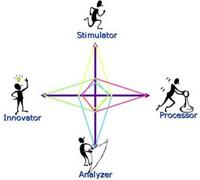At work & at home, each of us has been & again will be in communication. Our personal communication styles will dictate to a great extent our success in coordinating action & in relationships. It's unfortunate that we usually enter into communication situations without an awareness of our personal styles of communicating. We just do what comes naturally to us (but not necessarily to others.) One thing is certain every communicator anywhere continually THINKS & ACTS. This is where we begin our exploration of communication styles: how we Think & Act?
In the Communication Styles , there are two thinking styles, and two acting styles,
Acting Style 1: The Stimulators as you might guess, people with this acting style strive to implement new actions quickly & intuitively, without structure. On teams & in meetings, stimulators will speak up to suggest easier ways to accomplish work & will be the first to embrace new approaches to old problems. Because they gravitate to dynamic situations, they'll be listening for rumors & clues about the next new program or initiative. They are oriented to individual action & achievement, & thus listen for appreciation of what they have accomplished on their own.
Acting Style 2: The Processors Sitting on the other end of the scale, Processors prefer to act according to a structured & systematic plan. They prefer to integrate new actions into existing systems. They are much less enamored of radical change than their Stimulator brethren. They stay on the alert on knitting different parts of different programs together, & look for appreciation of the well-oiled processes & systems they design rather than grand individual achievements.
Thinking Style 1: The Innovators-Innovators are in love with ideas. They are future-oriented & continually focused on opportunities & possibilities. There are few ideas & concepts that escape their attention, & they will keep shifting these in their minds until they find some nuggets that they can apply to problems at hand. In most organizations, these are the people who get tasked with brainstorming new products & programs, & "out of the box" initiatives.
Thinking Style 2: The Analyzers-Analyzers take the same amount of mental energy their Innovator colleagues use & apply it to dissecting ideas, processes, & programs. They are information harvesters who challenge ideas & assumptions with facts, data, & information. They are always listening for hidden problems & solutions & like to be appreciated for their thorough investigations. These people ask lots of questions & put everything in front of them through a battery of mental tests & challenges. They are "detail people" who are not likely to dive into untested waters.
In the Communication Styles , there are two thinking styles, and two acting styles,

Acting Style 1: The Stimulators as you might guess, people with this acting style strive to implement new actions quickly & intuitively, without structure. On teams & in meetings, stimulators will speak up to suggest easier ways to accomplish work & will be the first to embrace new approaches to old problems. Because they gravitate to dynamic situations, they'll be listening for rumors & clues about the next new program or initiative. They are oriented to individual action & achievement, & thus listen for appreciation of what they have accomplished on their own.
Acting Style 2: The Processors Sitting on the other end of the scale, Processors prefer to act according to a structured & systematic plan. They prefer to integrate new actions into existing systems. They are much less enamored of radical change than their Stimulator brethren. They stay on the alert on knitting different parts of different programs together, & look for appreciation of the well-oiled processes & systems they design rather than grand individual achievements.
Thinking Style 1: The Innovators-Innovators are in love with ideas. They are future-oriented & continually focused on opportunities & possibilities. There are few ideas & concepts that escape their attention, & they will keep shifting these in their minds until they find some nuggets that they can apply to problems at hand. In most organizations, these are the people who get tasked with brainstorming new products & programs, & "out of the box" initiatives.
Thinking Style 2: The Analyzers-Analyzers take the same amount of mental energy their Innovator colleagues use & apply it to dissecting ideas, processes, & programs. They are information harvesters who challenge ideas & assumptions with facts, data, & information. They are always listening for hidden problems & solutions & like to be appreciated for their thorough investigations. These people ask lots of questions & put everything in front of them through a battery of mental tests & challenges. They are "detail people" who are not likely to dive into untested waters.
This comment has been removed by a blog administrator.
ReplyDeleteThis comment has been removed by a blog administrator.
ReplyDeletethanx for commenting on my thoughts ........though you hardly know me & hence are unfamiliar with my life.......anyway......take care
ReplyDeletethanx for writing in.......& for your offer......take care
ReplyDeleteThis comment has been removed by a blog administrator.
ReplyDeleteThis comment has been removed by a blog administrator.
ReplyDeleteThis comment has been removed by a blog administrator.
ReplyDeleteThis comment has been removed by a blog administrator.
ReplyDeleteThis comment has been removed by a blog administrator.
ReplyDeleteThis comment has been removed by a blog administrator.
ReplyDeleteThis comment has been removed by a blog administrator.
ReplyDeleteThis comment has been removed by a blog administrator.
ReplyDeleteThis comment has been removed by a blog administrator.
ReplyDeleteThis comment has been removed by a blog administrator.
ReplyDeleteThis comment has been removed by a blog administrator.
ReplyDeleteThis comment has been removed by a blog administrator.
ReplyDeleteThis comment has been removed by a blog administrator.
ReplyDeleteThis comment has been removed by a blog administrator.
ReplyDelete